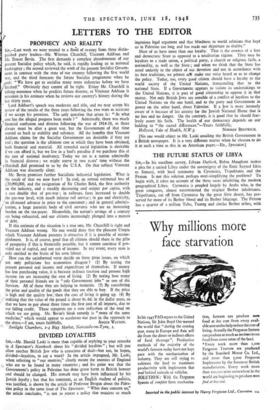DIVIDED LOYALTIES
Sta,—Mr. Harold Laski is more than capable of replying to your remarks in A Spectator's Notebook about his " divided loyalties " ; but will you allow another British Jew who is conscious of dual—but not, he hopes, divided—loyalties, to say a word? In the article impugned, Mr. Laski, when referring to " our enemies," clearly meant the enemies of England 1/2, who are to be found in many countries ; and his point was that the Government's policy in Palestine has done:grave harm to British honour and should be changed. His remark may have been influenced by his Jewish loyalty ; but that his comment, as an English student of politics, was justified, is shown by the article of Professor Brogan about the Pales- tine policy in the same issue of The Spectator. " What does concern us," the article concludes, " is not to repeat a policy that requires so much
ingenious legal argument and that blindness to world relations that kept us in Palestine too long and has made our departure so shabby."
Most of us have more than one loyalty. That is the essence of a free and democratic State as opposed to a totalitarian regime. They may be loyalties to a trade union, a political party, a church or religious faith, a nationality, as well as the State ; and when we think that the State has acted unjustly to the object of our devotion and not in accordance with its best traditions, we prbtest anti make our voice heard so as to change the policy. Today, too, every good citizen should have a loyalty to the world society of the United Nations, transcending that to the national State. If a Government appears to violate its undertakings to the United Nations, it is part of good citizenship to oppose it in that matter. Not only British Jews are sensible of a conflict of loyalties to the United Nations on the one hand, and to the party and Government in power on the other hand, about Palestine. If a Jew is more intensely aware of it because of his anxiety for the Jewish National Home that is no loss and no danger. On the contrary, it is good that he should fear- lessly assert his faith. The health of our democracy depends on our holding to " the sacred differences."—Yours faithfully,
[No one would object to Mr. Laski assailing the British Government in a British newspaper. It is a very different matter when he chooses to do it at such a time as this in an American paper.—En., Spectator.]


































 Previous page
Previous page